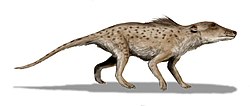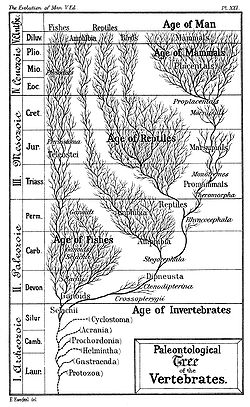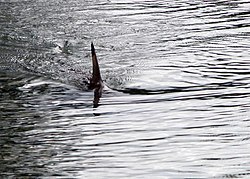The evolution of cetaceans is thought to have begun in the Indian subcontinent from even-toed ungulates (Artiodactyla) 50 million years ago (mya) and to...
84 KB (9,890 words) - 15:28, 11 July 2025
Cetacea (redirect from Anatomy of cetaceans)
genetic and fossil evidence places cetaceans within the even-toed ungulates, most closely related to hippopotamus. Cetaceans have been extensively hunted for...
122 KB (13,313 words) - 23:31, 27 July 2025
List of cetacean genera List of extinct cetaceans List of individual cetaceans Evolution of cetaceans Archaeoceti List of whale vocalizations List of marine...
76 KB (3,080 words) - 18:57, 2 July 2025
Cetacean intelligence is the overall intelligence and derived cognitive ability of aquatic mammals belonging in the infraorder Cetacea (cetaceans), including...
49 KB (5,470 words) - 20:06, 23 May 2025
Indohyus (category Eocene mammals of Asia)
the whales, and suggests a new understanding of the evolution of cetaceans. Pakicetus Evolution of cetaceans Bajpai, S; Thewissen, JG; and Sahni, A (November...
7 KB (588 words) - 15:36, 1 August 2025
mammals, the even-toed ungulates. The earliest cetaceans were still hoofed mammals. These early cetaceans became gradually better adapted for swimming than...
33 KB (2,466 words) - 02:20, 4 July 2025
Vasuki indicus (category Eocene reptiles of Asia)
from Kachchh (Gujarat, India) and its implications for locomotor evolution of cetaceans". Current Science. 79 (10): 1478–1482. ISSN 0011-3891. JSTOR 24105112...
13 KB (1,139 words) - 09:02, 27 July 2025
Pakicetus (category Prehistoric cetacean genera)
cetaceans, are artiodactyls. Wikimedia Commons has media related to Pakicetus. Cetaceans portal Paleontology portal Indohyus Evolution of cetaceans Bajpai...
17 KB (1,734 words) - 20:45, 2 August 2025
Rodhocetus (category Prehistoric cetacean genera)
Rodhocetus. Wikispecies has information related to Rodhocetus. Evolution of cetaceans Gingerich et al. 1994, p. 844 Rhodocetus in the Paleobiology Database...
13 KB (1,394 words) - 13:37, 6 May 2025
longer than in modern cetaceans (but still shorter than in some extinct cetaceans with undulating spines.) Motion in the spine of pakicetids was further...
15 KB (1,489 words) - 00:07, 28 July 2025
Evolution of cetaceans Berta, Annalisa (2012). Return to the Sea : The Life and Evolutionary Times of Marine Mammals. Berkeley, CA: University of California...
10 KB (1,058 words) - 05:03, 20 May 2025
Dorudon (category Prehistoric cetacean genera)
shown by unhealed bite marks on the skulls of some juvenile Dorudon. Paleontology portal Evolution of cetaceans Andrews 1906, p. 255 Dorudon in the Paleobiology...
16 KB (1,699 words) - 11:03, 2 June 2025
Ambulocetus (category Monotypic prehistoric cetacean genera)
Ambulocetus is among the best-studied of Eocene cetaceans, and serves as an instrumental find in the study of cetacean evolution and their transition from land...
46 KB (5,680 words) - 04:26, 18 June 2025
Artiodactyl (redirect from Evolution of even-toed ungulates)
others opt to include cetaceans within the existing name of Artiodactyla. Some researchers use "even-toed ungulates" to exclude cetaceans and only include...
67 KB (6,658 words) - 16:39, 27 July 2025
Whale (redirect from Blackfish (cetaceans))
which consists of even-toed ungulates. Their closest non-cetacean living relatives are the hippopotamuses, from which they and other cetaceans diverged about...
109 KB (12,337 words) - 00:31, 16 July 2025
Ungulate (redirect from Evolution of ungulates)
perissodactyls, one lineage of artiodactyls began to venture out into the seas. The traditional theory of cetacean evolution was that cetaceans were related to the...
59 KB (5,864 words) - 18:43, 29 July 2025
Fish fin (redirect from Evolution of paired fins)
of these mammals started returning to the sea, including the cetaceans (whales, dolphins and porpoises). Recent DNA analysis suggests that cetaceans evolved...
91 KB (7,811 words) - 02:09, 12 July 2025
Ambulocetidae is a family of early cetaceans from northern South Asia. The genus Ambulocetus, after which the family is named, is by far the most complete...
7 KB (686 words) - 16:56, 5 July 2025
The evolution of mammals has passed through many stages since the first appearance of their synapsid ancestors in the Pennsylvanian sub-period of the...
141 KB (14,966 words) - 16:00, 21 July 2025
mammals Evolution of cetaceans Evolution of horses Evolution of primates – Origin and diversification of primates through geologic time Evolution of humans –...
26 KB (4,445 words) - 15:34, 30 January 2025
Maiacetus (category Monotypic prehistoric cetacean genera)
12% larger than the one interpreted as female. Cetaceans portal Paleontology portal Evolution of cetaceans Gingerich PD, Ul-Haq M, von Koenigswald W, Sanders...
5 KB (482 words) - 02:43, 2 August 2025
Cetacean surfacing behaviour is a grouping of movement types that cetaceans make at the water's surface in addition to breathing. Cetaceans have developed...
42 KB (5,093 words) - 19:03, 27 July 2025
timeline of human evolution outlines the major events in the evolutionary lineage of the modern human species, Homo sapiens, throughout the history of life...
88 KB (3,543 words) - 06:23, 28 July 2025
Baleen whale (redirect from Baleen cetaceans)
Cetotheriidae (the pygmy right whale). There are currently 16 species of baleen whales. While cetaceans were historically thought to have descended from mesonychians...
117 KB (12,827 words) - 19:26, 1 August 2025
Cetotherium (category Miocene cetaceans)
to these whales.[citation needed] Paleontology portal Evolution of cetaceans "Classification of the family Cetotheriidae". Fossilwork. Retrieved 17 December...
11 KB (1,029 words) - 04:45, 19 November 2024
some point, evolution is bound to stumble upon intelligence, a trait presently identified with at least primates, corvids, and cetaceans. In cladistics...
59 KB (5,838 words) - 19:20, 31 July 2025
fairly similar to modern cetaceans in overall body form and function. Some genera tend to show signs of convergent evolution with mosasaurs by having...
12 KB (1,192 words) - 19:45, 24 May 2025
Basilosaurus (category Fossil cetaceans misidentified as reptiles)
been one of the first fully aquatic cetaceans, sometimes referred to as the Pelagiceti. Basilosaurus, unlike modern cetaceans, had various types of teeth–such...
63 KB (6,144 words) - 17:25, 2 July 2025
Remingtonocetidae (category CS1 maint: DOI inactive as of July 2025)
Rayanistes Bebej, Zalmout, El-Aziz, Antar, and Gingerich, 2016 Cetaceans portal Evolution of cetaceans "Remingtonocetidae". paleobiodb.org. Retrieved 2021-09-01...
15 KB (1,389 words) - 11:51, 12 July 2025
on the back of most marine and freshwater vertebrates. Dorsal fins have evolved independently several times through convergent evolution adapting to marine...
8 KB (884 words) - 13:05, 20 July 2025





























